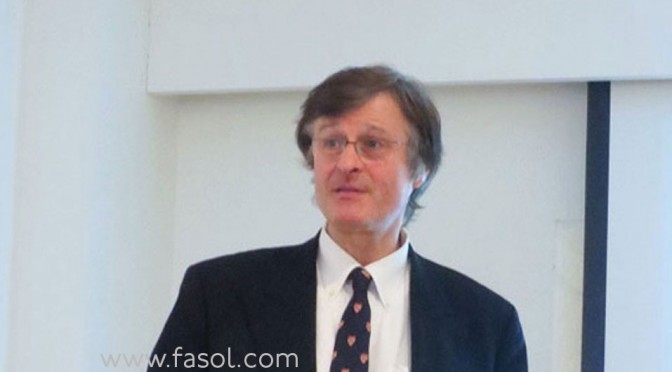Ludwig Boltzmann as leader
(Gerhard Fasol, CEO of Eurotechnology Japan KK. Served as Associate Professor of Tokyo University, Lecturer at Cambridge University, and Manger of Hitachi Cambridge R&D Lab.)
Keynote presented at the 6th Ludwig Boltzmann Symposium on February 20, 2014 at the Embassy of Austria in Tokyo.
Ludwig Boltzmann, the scientist
Ludwig Boltzmann’s greatest contribution to science is that he linked the macroscopic definition of Entropy which came from optimizing steam engines at the source of the first industrial revolution to the microscopic motion of atoms or molecules in gases, this achievement is summarized by the equation S = k log W, linking entropy S with the probability W. k is the Boltzmann constant, one of the most important constants in nature, linked directly to temperature in the SI system of physical units. This monumental work is maybe Boltzmann’s most important creation but by far not the only one. He discovered many laws, and created many mathematical tools, for example Boltzmann’s Equations, which are used today as tools for numerical simulations of gas flow for the construction of jet engines, airplanes, automobiles, in semiconductor physics, information technology and many other areas. Although independently discovered, Shannon’s theory of noise in communication networks, and Shannon’s entropy in IT is also directly related to Boltzmann’s entropy work.
Ludwig Boltzmann, the leader
Ludwig Boltzmann was not only a monumental scientist, but also an exceptional leader, teacher, educator and promoter of exceptional talent, and he promoted many women.
One of the women Ludwig Boltzmann promoted was Henriette von Aigentler, who was refused permission to unofficially audit lectures at Graz University. Ludwig Boltzmann advised and helped her to appeal this decision, in 1874, Henriette von Aigentler passed her exams as a high-school teacher, and on July 17, 1876, Ludwig Boltzmann married Henriette von Aigentler, my great-grand mother.
Another woman Ludwig Boltzmann promoted was his student Lise Meitner (Nov 1878 – Oct 27, 1968), who later was part of the team that discovered nuclear fission, work for which Otto Hahn was awarded the Nobel Prize. Lise Meitner was also the second woman to earn a Doctorate degree in Physics from the University of Vienna. Element 109, Meitnerium, is named after Lise Meitner.
Nagaoka Hantaro, First President of the University of Osaka – Ludwig Boltzmann’s pupil
The first President of Osaka University (1931-1934), Nagaoka Hantaro (1865 – 1950) was Ludwig Boltzmann’s pupil around 1892 – 1893 at Muenchen University.
Ludwig Boltzmann, a leader of science
Ludwig Boltzmann was connected in intense discussions with all major scientists of his time, he travelled extensively including three trips to the USA in 1899, 1904 and 1905, about which he wrote the article “Die Reise eines deutschen Professors ins El Dorado”, published in the book “Populäre Schriften”.
Ludwig Boltzmann published his first scientific publication at the age of 21 years in 1865. He was appointed Full Professor of Mathematical Physics at the University of Graz in 1869 at the age of 25 years, later in 1887-1888 he was Rektor (President) of the University of Graz at the age of 43 years.
He spent periods of his professional work in Vienna, at Graz University (1869-1873 and 1876-1890), at Muenchen University (1890-1894). When working at Muenchen University, he discovered that neither he nor his family would not receive any pension from his employment at Muenchen University after an eventual retirement or in case he dies before retirement, and therefore decided to return to Vienna University in 1894, where he and his family were assured of an appropriate pension. During 1900-1902 he spent two years working in Leipzig, where he cooperated with the Nobel Prize winner Friedrich Wilhelm Ostwald.
Ludwig Boltzmann did not shy away from forceful arguments to argue for his thoughts and conclusions, even if his conclusions were opposite to the views of established colleagues, or when he felt that philosophers intruded into the field of physics, i.e. used methods of philosophy to attempt solving questions which needed to be solved with physics measurements, e.g. to determine whether our space is curved or not. Later in his life he was therefore also appointed to a parallel Chair in Philosophy of Science, and Ludwig Boltzmann’s work in Philosophy of Science is also very fundamentally important.
I discovered the unpublished manuscripts of Boltzmann’s lectures on the Philosophy of Science, stimulated and encouraged by myself, and with painstaking work my mother transcribed these and other unpublished manuscripts, and prepared them for publication, to make these works finally accessible to the world, many years after Ludwig Boltzmann’s death.
Ludwig Boltzmann was a down to earth man. He rejected the offer of Nobility by His Majesty, The Emperor of Austria, i.e. the privilege to be named Ludwig von Boltzmann (or a higher title) instead of commoner Ludwig Boltzmann. Ludwig Boltzmann said: “if our common name was good enough for my parents and ancestors, it will be good enough for my children and grand children…”
Summary: understanding Ludwig Boltzmann.
Boltzmann’s thoughts and ideas are a big part of our understanding of the world and the universe.
His mathematical tools are used every day by today’s engineers, bankers, IT people, physicists, chemists… and even may contribute to solve the world’s energy problems.
Ludwig Boltzmann stood up for his ideas and conclusions and did not give in to authority. He rejected authority for authority’s sake, and strongly pushed his convictions forward.
What can we learn from Ludwig Boltzmann?
- empower young people, recognize and support talent early.
- exceptional talent is not linear but exponential.
- move around the world. Connect. Interact.
- empower women.
- don’t accept authority for authority’s sake.
- science/physics/nature need to be treated with the methods of physics/science.
- no dogmas.
- support entrepreneurs, Ludwig Boltzmann did.

Copyright 2014 Eurotechnology Japan KK All Rights Reserved

Comments and discussions